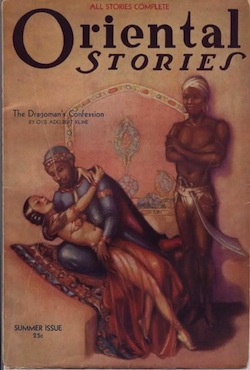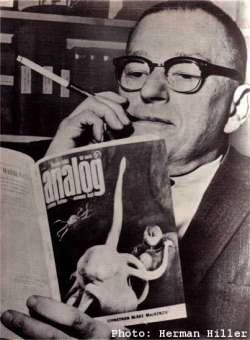The New Pulp Era: Ghostwriting, Ebooks, and the Economics of Now

A lot of writers and readers are saying we have entered a new pulp era, a repeat of those days when hardworking writers pumped out exciting fiction in large quantities while facing very tight deadlines. The old pulp era died long ago, and was replaced with modern traditional publishing. Under that model, writers usually only came out with a book a year, and if they did more than that it was generally under a pseudonym. Traditional houses seem to have been under the impression that “less is more” when it came to a writer’s output.
Readers disagree. They want more from their favorite authors, and they want it now. Those writers who have come to the top of the new indie publishing revolution tend to be those who write a lot, generally in series, and keep up a consistent quality. Some traditionally published writers such as Guy Haley are moving that direction too. In our interview with him, he talked about how he has to write five novels a year if he wants to make a living at his writing.
Even superstars such as James Patterson are getting in on the game. A post at Non-Fiction Novelist talks about how Patterson’s new project “Book Shots” fits perfectly into the pulp mentality. These thrillers and romances are touted as having lots of action and no padding, just like a good pulp story should. They’re all under 150 pages and cost less than $5. Plus there’s a whole lot of them.
I’m seeing a similar trend in online start-up publishers. My own body of indie published work, while doing OK, is not bringing me enough to live on, so I make up the deficiency by ghostwriting. This is a relatively new venture for me as I shift steadily away from nonfiction writing, but the trend I’m seeing is remarkable.
Ghostwriting always involves a strict written agreement not to take credit for a work, so what follows will by necessity be of a general nature.

Most of my ghostwriting clients are actually editors of small publishing houses who have lines under several house names for which I am not the only contributor. This helps each “author” come out with a book a month or more. The books are slickly produced, with professional cover design and editing. The books are often only available in ebook and are priced affordably. They’re also short. I have never ghostwritten a book longer than 60,000 words, and I’m always given a strict word count.
The time factor is ever present. My deadlines are tight and generally written in stone. Often I’m only given a month. It helps that I’m given freedom of subject. If the books are in a series, I get the series while other writers work on different series or stand alones under the same house name. Once again, this helps make the house name bring out more books in a short amount of time.
This line of work can get you into some odd situations. Like most writers, I work on one project, get it done, and go onto the next. Earlier this year, however, two ghostwriting clients asked me to take projects and the deadlines overlapped. Neither would budge on the timeline, because of their need to get out more product. It was either take both jobs, or only settle for one.
I took both. Writing two novels at the same time can lead to a Scanners-style head explosion, so I had to play a psychological trick on myself. One novel I wrote at home on my desktop. The other I wrote on my laptop at a cafe. I also scheduled other activities like going to the gym before switching from one to the other. While the situation still wasn’t ideal, it worked and both publishers got their books.

And these publishers have an insatiable appetite. One of my clients gives me books in a genre I really like. Unfortunately, he also pays the least. Isn’t that always the way? I’ve been bugging him for a raise because I really want to write more for him. Recently he agreed to the raise, on one condition–I would have to write two 50,000 word novels in a month!
Now that’s some serious pulp era stuff there, my friends. I’m pretty quick on the keyboard, but I’m not a 1960s Robert Silverberg, nor am I a Deity of the Word Count like some authors I wrote about recently. Writing two novels in a month, even if they are in the same genre, would seriously tax my abilities, not to mention keep me from even thinking about my own writing.
But I have not yet said no to that offer. It’s tempting to do it just to say that I have done it. My wife, however, is unimpressed.
“Don’t do it,” she says. “I have to live with you.”
Is she implying that I get obsessive about writing projects and a bit tense near deadlines? Nonsense!
Maybe I can pull it off without her noticing. . .
So that’s my two cents, which won’t even buy you a word these days. I’d love to hear from other writers and ghostwriters about their experiences in this new world of publishing. Tell me what you think in the comments section!
Images courtesy Wikimedia Commons.
Sean McLachlan is the author of the historical fantasy novel A Fine Likeness, set in Civil War Missouri, and several other titles, including his post-apocalyptic series Toxic World that starts with the novel Radio Hope. His historical fantasy novella The Quintessence of Absence, was published by Black Gate. Find out more about him on his blog and Amazon author’s page.
Hey Sean: Frank Schildiner, a new pulp author, said your post was “very impressive and on point.”
I guess i don’t completely understand the definition of Ghost Writing.
So a publisher is paying you to write something that they will say someone else wrote? Do you have to imitate someone else’s style?
Or are they just publishing it under a pseudonym and paying you a one time fee?
Glenn: Yes, they are publishing it under a pseudonym and paying me a one time fee. Another type of ghostwriting is when a celebrity wants a book in their name and has an author do it. Politicians and actors do this a lot. I’m not getting those gigs. I wish I could, because they pay more!
There have been a few comments on my FB post about this one, Sean.
https://www.facebook.com/bob.byrne.9/posts/1098091793560388?comment_id=1098171890219045¬if_t=feed_comment¬if_id=1475695131114822
Good article, thanks. It made me look at my own word count and ways how I can improve on that for the sake of productivity. Can you give a ballpark figure of what ghostwriters are paid and how does one get into that?
This is my line of thinking as well. Nice article!
Bob: Cool!
Harold: Thanks!
Woelf: Pay is across the spectrum. I won’t go under 3.5 cents a word. I’ve gotten as much as 10. The best place to look for ghostwriting gigs are the freelance sites like Upwork. You have to wade through a lot of dreck, however. There are jokers out there who offer you $100 for a 60,000 word novel. No, that wasn’t a typo.
I forgot to mention the biggest market for ghostwriting is romance. Currently there’s a huge appetite for billionaire romances and mail order bride romances. I have no interest in writing either of those. You can’t fake a genre you don’t enjoy, or at least I can’t.
To get a job, it’s best to have a few books of your own out. When applying, I always send the client an electronic copy of one of my books, whichever is closest to what they are looking for.
Hope this helps!
Interesting read, Sean.
My experience of ghosting is more limited than yours, but I have used my indie titles to get a toe in the door. Finding enough jobs (and jobs worth making the time for) has been tough, though, and you’re not kidding when you talk about the dreck on Upwork…
[…] discorso della velocità è importante perché proprio ieri, su Black Gate, Sean MacLachlan citava Guy Haley, eccellente autore, che per campare come autore a tempo pieno, e sul mercato anglosassone (ci […]
Fascinating article… I’d love to see some thoughts about pros/cons of ghostwriting/personal writing (I’d imagine the immediacy of the ghostwriting paycheck is a big factor?)
Also, some other freelance websites to find this stuff!
Two 50 thousand word novels in one month?! Good Lord. Robert E. Howard himself wouldn’t even be able to manage that. I’d be happy to be proven wrong, though!
thehessiangoeshome: Sounds like a good idea for a later post. Stay tuned!
Most freelance websites offer ghostwriting gigs. Cast your net wide, because as I said there are a lot of insultingly cheap offers out there. Once you get established and your profile shows a lot of successful ghostwriting assignments, you’ll have people come to you.